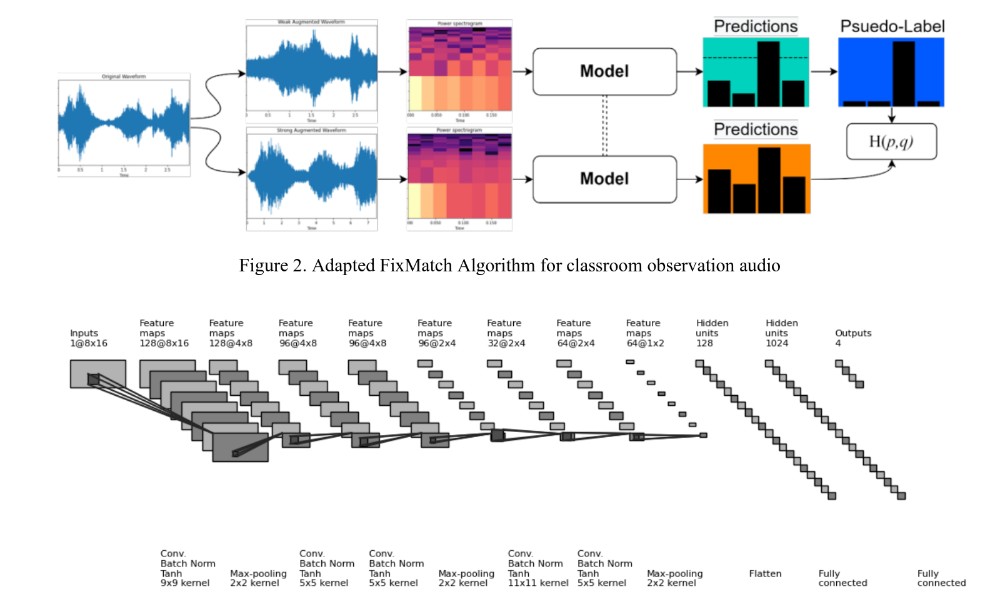Link
Abstract
Systematic classroom observation is often used in evaluating and enhancing the quality of classroom instruction. However, classroom observation can potentially suffer from human bias. In addition, the traditional classroom observation is too expensive for resource-constrained environments (e.g., Sub-Saharan Africa, South and Central Asia). A cost-effective automation of classroom observation could potentially enhance both quality and resolution of feedback to the teacher, and hence potentially result in enhancing quality of instruction. Audio-based automatic classroom observation using supervised deep learning techniques has yielded good results in limited contexts. However, one challenge when using supervised techniques is the high cost of collecting and labelling the classroom audio data. One solution for such data-starved scenarios is to use semi-supervised learning (SSL) which requires significantly lesser data and labels. This paper explores an audio-adaptation of the state-of-the-art SSL FixMatch algorithm to automate classroom observation. An adaptation of the FixMatch algorithm was proposed to automate the coding for the Stallings class observation system. The proposed system was trained on classroom audio data collected in the wild. The supervised approach had an F1-score of 0.83 on 100% labeled data. The proposed FixMatch adaptation achieved an impressive F1-score of 0.81 on 20% labeled data, 0.79 on 15% labeled data, 0.76 on 10% labeled data, and 0.72 using only 5% of labeled data. This suggests that algorithms like FixMatch that use consistency regularization and pseudo-labeling have a great potential for being used to automate classroom observation using a small labelled set of audio snippets.
Citation
A. Chanchal and I. Zualkernan, “Exploring Semi-Supervised Learning for Audio-Based Automated Classroom Observations,” International Association for the Development of the Information Society, 2022. Accessed: Sep. 23, 2024. Available:Online
@proceeding{chanchal_exploring_2022,
title = {Exploring {Semi}-{Supervised} {Learning} for {Audio}-{Based} {Automated} {Classroom} {Observations}},
url = {https://eric.ed.gov/?id=ED626900},
abstract = {Systematic classroom observation is often used in evaluating and enhancing the quality of classroom instruction. However, classroom observation can potentially suffer from human bias. In addition, the traditional classroom observation is too expensive for resource-constrained environments (e.g., Sub-Saharan Africa, South and Central Asia). A cost-effective automation of classroom observation could potentially enhance both quality and resolution of feedback to the teacher, and hence potentially result in enhancing quality of instruction. Audio-based automatic classroom observation using supervised deep learning techniques has yielded good results in limited contexts. However, one challenge when using supervised techniques is the high cost of collecting and labelling the classroom audio data. One solution for such data-starved scenarios is to use semi-supervised learning (SSL) which requires significantly lesser data and labels. This paper explores an audio-adaptation of the state-of-the-art SSL FixMatch algorithm to automate classroom observation. An adaptation of the FixMatch algorithm was proposed to automate the coding for the Stallings class observation system. The proposed system was trained on classroom audio data collected in the wild. The supervised approach had an F1-score of 0.83 on 100\% labeled data. The proposed FixMatch adaptation achieved an impressive F1-score of 0.81 on 20\% labeled data, 0.79 on 15\% labeled data, 0.76 on 10\% labeled data, and 0.72 using only 5\% of labeled data. This suggests that algorithms like FixMatch that use consistency regularization and pseudo-labeling have a great potential for being used to automate classroom observation using a small labelled set of audio snippets.},
language = {en},
urldate = {2024-09-23},
institution = {International Association for the Development of the Information Society},
author = {Chanchal, Akchunya and Zualkernan, Imran},
year = {2022},
note = {Publication Title: International Association for Development of the Information Society
ERIC Number: ED626900},
keywords = {Algorithms, Audio Equipment, Classroom Environment, Classroom Observation Techniques, Computer Software, Cost Effectiveness, Educational Quality, Feedback (Response), Learning Processes, Scores, Supervision, Teacher Effectiveness, Teacher Evaluation},
file = {Chanchal and Zualkernan - 2022 - Exploring Semi-Supervised Learning for Audio-Based Automated Classroom Observations.pdf:/home/akchunya/Googledrive/zoterodb/Chanchal and Zualkernan - 2022 - Exploring Semi-Supervised Learning for Audio-Based Automated Classroom Observations.pdf:application/pdf},
}
